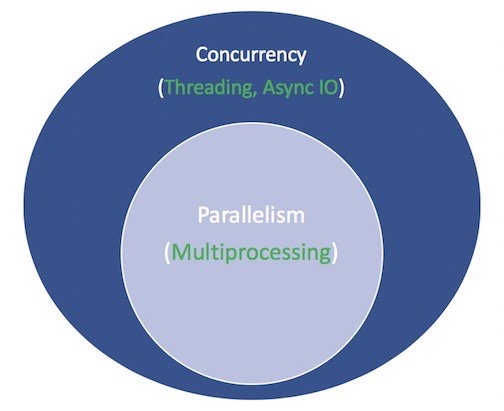..
多进程/多线程/协程 零零散散的记录
日常 Python 编程若遇到性能瓶颈, 大部分还是由于 I/O 密集型 的操作导致, 例如调用外部接口请求数据超时, 造成整个处理流程的阻塞. 一般会采用多线程来解决这类问题, 但不知道就为什么陷入了多进程, 多线程, 协程的迷惑之中. 用这篇文章记录自己零零星星的学习和思考.
Threading, Multiprocessing & Coroutine 直接的关联关系?
看完这篇文章后, 再看下面这张图, 真的会有恍然大悟的感觉:

多线程
在Linux中,线程是由进程来实现,线程就是共享内存的轻量级进程.
调度的策略?
- 时间片轮转(Round-robin)
- 先入先出(FIFO), 除非有更高优先级的线程进入
- 分时调度: 优先级随线程的运行时间而动态改变,以确保所有具有SCHED_OTHER策略的线程公平运行
python 实现 个人倾向用 concurrency.future 实现, 一个小 demo:
from concurrent.futures import ThreadPoolExecutor
pool_executor = ThreadPoolExecutor(max_workers=20)
# 获取每个检查项的结果
results = pool_executor.map(_check, risk_items)
协程 Coroutine
- 从名字上看:
co其实就是相互协作的意思, async IO is a single-threaded, single-process design: cooperative multitasking, 精髓就是在一个进程一个线程内的协作. - 和多线程对比: 多线程是在操作系统去调度, 控制执行的顺序. 协程更多的是从代码层面announcing when they are ready to be switched out. 可以参考下面这张图, 很清晰:

实现原理: event loop, controls how and when each task gets run. 假设只有两种状态: Ready & Waiting. 把两种状态的 event 放到对应的list, 不断维护并消费, 直到~~
调度策略: 优先执行等的最久的 event. 所以是个 queue?
优势: This allows us to share resources a bit more easily in asyncio than in threading. You don’t have to worry about making your code thread-safe.
小 demo:
import asyncio
async def count():
print("One")
await asyncio.sleep(1)
print("Two")
async def main():
await asyncio.gather(count(), count(), count())
if __name__ == "__main__":
import time
s = time.perf_counter()
asyncio.run(main())
elapsed = time.perf_counter() - s
print(f"{__file__} executed in {elapsed:0.2f} seconds.")
一些疑惑
- 为什么不能直接用在 requests 库中? Requests 库是同步的, 会阻塞事件循环. 可以看下 asyncio.tasks.sleep 的实现.
- async 和 await 的具体含义? The keyword await passes function control back to the event loop.
总结:
| 优点 | 缺点 | 使用场景 | |
|---|---|---|---|
| process | independent state | enormous communication cost | |
| threads | shared state | managing race conditions & cost of switch | |
| async | the cost of task switches is very low 并且不需要锁, 程序不容易出错 | 必须添加“yield” or “await” 关键字告诉任务切换. |
Ref
- https://realpython.com/async-io-python/
- https://www.youtube.com/watch?v=9zinZmE3Ogk"Your weakness is ur strength and ur weakness is ur strength." 哈哈